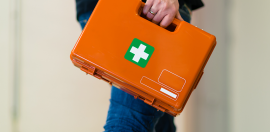Recovery Is Possible

21 November 2016 at 10:08 am
Dr Cathy Kezelman AM is the president of Blue Knot Foundation, the leading national organisation supporting the estimated five million Australian adults who are survivors of childhood trauma. She is this week’s Changemaker.
As many as one in four Australian adults have experienced childhood abuse.
Blue Knot Foundation, formerly known as ASCA – Adults Surviving Child Abuse – has become a voice for adult survivors and their needs providing specialist phone counselling, support, education, resources, training and supervision to help them recover.
Kezelman, who is herself a survivor, has been a lifelong advocate for adult survivors of childhood trauma.
She worked in medical practice for 20 years, mostly as a GP and has held leadership roles in ASCA / Blue Knot Foundation for 12 years, including two terms as chair, before being appointed president in 2012.
Under her stewardship Blue Knot Foundation has grown from a peer-support organisation to a leading national organisation combining a prominent consumer voice with that of researchers, academics and clinicians advocating for socio-political change and informed responsiveness to complex trauma.
Kezelman also published a memoir chronicling her journey of recovery from child sexual abuse – Innocence Revisited: A Tale in Parts.
In this week’s Changemaker, Kezelman talks about the path to recovery, the importance of Blue Knot Day as a major event on the calendar for raising awareness of the impact that childhood abuse has, and how her life is not just about surviving.
 You worked in medical practice for 20 years, mostly as a GP, what encouraged you to move into the not-for-profit sector?
You worked in medical practice for 20 years, mostly as a GP, what encouraged you to move into the not-for-profit sector?
It was a personal experience. So I started dealing with my own childhood abuse experiences and so that took me out of the medical profession. It wasn’t really a conscious decision, I was quite unwell and had to seek support for my own recovery. And in that process I found this organisation, at that time it was called ASCA and originally I came here really for my own support.
You are a survivor of childhood trauma, how does the lived experience influence your ability to help others recover?
Certainly what it has done for me is give me a passion to help others in that I felt privileged that I could afford good support and I know a lot of other people can’t. I do believe it gives you an insight into how challenging the process of recovery can be but also a sense of optimism that recovery can happen.
Obviously, everyone’s experience is individual and I certainly can’t speak for anyone else but I do think that having a lived experience can certainly be a benefit around all sorts of issues. And I suppose also what was interesting for me was I was a medico, but what I found was that my medical degree didn’t prepare me at all for anything that’s happened to me. It gave me no additional insight and I also found that a lot of my medical colleagues really also had very little insight into what it means to have been abused as a child and what it can take to actually reclaim your health.
What kind of impact does childhood trauma have on adults?
When children are abused or traumatised it obviously happens during a time when the brain is growing and developing and it is often perpetrated by the very people who are meant to look after a child. It often goes on for a long time. It is often repeated. And often the child doesn’t have anyone to go to to make sense of it. So obviously that can have potentially profound effects on the way the brain develops, on the way pathways are laid down, and it really can affect the very development of your sense of self, your self-esteem, your ability to relate to yourself, your ability to relate to others and to the world.
It can also affect your physical health, your mental health and often the ways people cope can become risk factors for health issues later in life for example smoking or alcohol or eating to excess. So we need to understand the ways survivors do cope and acknowledge that they have survived and there is an inherent strength in that, and stop judging the way people have survived and work with them to identify their strengths to build on them to find constructive ways of proceeding through life.
What is the importance of events such as Blue Knot Day in raising awareness?
I think our view would be that every day should be Blue Knot Day, because we know that one in four adults have experienced some form of childhood trauma and that’s an incredible number of people. So we will all know someone, even if they haven’t told us.
But a day like Blue Knot Day is setting aside a day that is specifically for adult survivors. And we’re trying to raise awareness of childhood trauma more broadly, so beyond abuse. People often think of sexual abuse alone and obviously there are many other ways people can be abused or experience neglect, grow up with domestic violence and so forth. So it is about really getting the message out that this is both very common, and that there is a lot of shame that people carry when they are abused in childhood and when society treats people who seek to disclose and are looking for help with stigma and taboo, that really reinforces the silence and secrecy which perpetuates childhood traumas. So it is really about trying to break down the barriers and say this is common, this can cause major damage, but yet it is a human right for everyone to have firstly a safe childhood but if they don’t, for them to be able to get pathways so that they can find a life that is constructive and connected and participating.
What can we do as a society to break down the taboo surrounding the issue?
We have seen with the current Royal Commission into Institutional Responses into Child Sexual Abuse that people are telling their stories and we’re seeing much, much more reporting around different forms of abuse. We’re seeing a lot of discussion and support around domestic violence so I think you know as a society we are starting to talk about issues that previously we didn’t speak about. We have certainly seen with mental health for example, that people now get up more and more and say “I have really experienced depression”, there is still a lot of stigma and shame but it has shifted and that is what we need to see around this issue as well.
Because often people who have experienced such forms of trauma, also have a mental illness or also struggle with their mental health. They may be homeless, they may not be able to hold down a job, and these are all challenges that often are judged by society. But we need to understand that these impacts are not about anyone’s personal weakness. This is about a normal response to something very abnormal that has happened to a child which should never happen.
This year the Blue Knot Foundation turned 21, how has the organisation evolved over that time?
The organisation started like a lot of organisations, as a peer-support organisation. It was developed by a number of survivors who couldn’t find anywhere to go for help and you know it started from a purely volunteer base in country New South Wales and it has now grown into a national organisation that combines very strong survivor input but with input also from academics and clinicians and professionals and people who work on a daily basis with survivors. So we’ve developed a lot of credibility.
At the end of 2012 we produced a set of guidelines, which were a global first, around how to respond to this sort of trauma and they’ve now had more than 12,500 downloads and they really have been the grounding for a very extensive education and training program that we now deliver round the country, with between 20 and 40 days of training a month, and that’s to workers and health professionals and legal professionals.
We also obviously provide direct support to survivors and their loved ones. We’ve got a helpline manned by trauma therapists which takes over 5,000 calls per annum, but sadly also can’t take more than that number of calls, which we don’t have the resources to respond to.
We also run workshops for survivors which help them understand just how abuse and trauma may have affected them and help to normalise their responses and their struggles so they can understand and also the people who support them can understand why they may not be able to hold down a job, why they may not have finished their education, why they may struggle daily to get out of bed.
What are the organisation’s current priorities?
We’ve been working very closely with the Royal Commission into Institutional Responses into Child Sexual Abuse so we continue to support their work and to advocate really for implementation of a national redress scheme. The federal government has just… announced that they will have a scheme for people who were sexually abused in Commonwealth Government institutions. We are obviously wanting to see all the states and territories and institutions opt into that scheme.
But beyond that, because our organisation represents the needs of adult survivors, not just of child sexual abuse but all forms of abuse and neglect and, you know, people who have grown up with a parent with their own trauma, as a result of a mental illness or a substance abuse, all of these people need support. So we’re continually advocating, further to the redress scheme, which has now announced a provision for 10 years of counselling and psychological care for survivors, that all survivors should have access to the right sort of care at the right time when they need it. Because recovery is so possible we want to remain, well we are, the thought, policy and practice leader in this area but just continue to disseminate that message and be a conduit for people to call our helpline, we’d obviously love to extend the hours on that helpline and further resource that, and the provision of the right sort of trauma-informed services to survivors, so we’d like to provide that and facilitate it.
How do you keep motivated?
I won’t lie, it has its moments. Like with any NGO it is challenging work, not just for me but for anyone involved in this. There is an infinite need. And you know we released a very important economic paper last year that shows, highly conservatively, that the annual cost of not responding to adults who have experienced or dealt with trauma is $9.1 billion per annum. So we know this is important work and I suppose what keeps us going here is the benefit we see.
You know the people who call our helpline and then send an email saying “this is the first time in my life I’ve been understood”, “an hour on the phone and it’s changed my life”, people who attend the workshop and say “I thought I was the only one but here I was in a room with others, I’m not an alien”. So it’s those sorts of very human but everyday responses that we hear about our work and about our training, about the helpline, about our survivors workshop that means that we are doing really important work and we know the importance of having a specialist service doing this because, without being critical of any other services, we know that many people have been re-traumatised in services that don’t have the right understanding around this sort of trauma and that’s why it is so critical that when a survivor picks up the phone or goes to a workshop or seeks help, that the person that’s on the receiving end of their approach understands how their life experience may have affected them, how hard it may be for them to reach out and can actually help them to feel safe and supported while trying to find out how best to help them. So that’s the critical aspect of what we do.
How do you spend your free time?
I’ve got a big family, so I’ve got four children, four adult children, I have two grandchildren, I have a lovely circle of friends, so I enjoy them as much as I can and obviously they are a priority for me. I love to go out and walk and I feel the sun. I do love to read when I get the time and I read voraciously when I’m on holidays. I love to go to the theatre. Obviously I love to eat out. So it is a full and rich life.
It is a constant juggling act but it is very fulfilled and I suppose that is the message. I am a survivor but my life is not just about surviving, it is definitely full, it is rich and that is really my vision for others.








